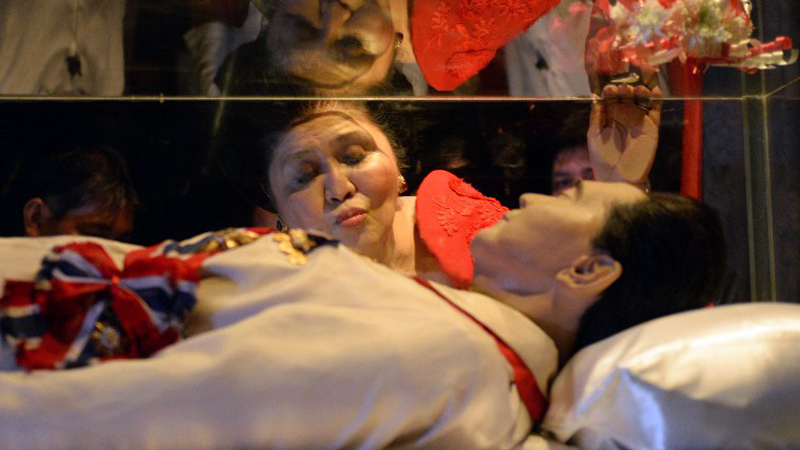SolGen: Burial at Libingan doesn’t make Marcos a hero

Former Philippine first lady and now congresswoman, Imelda Marcos, kisses the glass case of her late husband president Ferdinand Marcos. AFP FILE PHOTO/TED ALJIBE
THE OFFICE of the Solicitor General (OSG) on Monday defended the plan of the Duterte administration to bury dictator Ferdinand E. Marcos at Libingan ng mga Bayani in Taguig City, claiming the interment of his remains there did not confer on him the status of a “hero.”
Even as the Duterte administration’s response to the mounting legal challenges to the burial acknowledged the “dark pages of history during martial law,” the Marcos family in a comment flatly denied human rights violations committed against the petitioners and other people “in general.”
Although the Supreme Court’s deadline for the administration and the Marcos family to respond to the petitions was on Monday morning, two more groups added to the legal challenges and brought the number to a total of five so far.
The fourth petition included members of the academe who joined Heherson T. Alvarez, Ninoy Aquino Movement founding chair and a 1971 Constitutional Commission delegate. The fifth petition was filed by a youth group, Samahan ng Progresibong Kabataan.
In a comment submitted to the high court, the OSG said President Duterte and other government officials were “not attempting to rewrite our nation’s history.”
“The interment of the remains of former President Marcos does not and will not make him a hero,” the comment read. “On the contrary, the interment of his remains at Libingan was due to the fact that the late Ferdinand Marcos was a former President of the Republic, statesman and soldier, whose remains may be and are to be interred at Libingan.”
The OSG argued that the petitioners wrongly applied Republic Act No. 289 to Libingan.
Toppled from power in a popular uprising in 1986, Marcos died in exile in Hawaii in 1989.
Not national pantheon
The petitions claimed Marcos, whose remains are kept in a refrigerated crypt in his hometown in Batac City, Ilocos Norte province, could not be buried at Libingan because RA 289 reserved it for heroes and patriots worthy of “inspiration and emulation” by succeeding generations.
The OSG, however, disagreed, saying Libingan was not the National Pantheon referred to by that law. It claimed that the cemetery was supposed to be erected on East Avenue, Quezon City.
“Despite the name, ‘Libingan ng mga Bayani,’ the long history of the cemetery tells us that its purpose has neither been to confer on the people buried therein the title of ‘hero’ nor to require that only those buried therein should be treated as ‘heroes,’” the comment read.
“No amount of heartfelt eulogy, gun salutes, holy anointment and elaborate procession and rituals can transmogrify the dark pages of history during martial law,” it added.
The OSG defended Mr. Duterte’s decision to have Marcos’ remains buried at Libingan for being well within his powers under the Constitution and the Administrative Code.
It described Marcos as “a former President and soldier” who was also qualified for burial at Libingan under Armed Forces of the Philippines Regulations G 161-375.
“In the exercise of his powers under the Constitution and the Administrative Code, President Duterte, in his wisdom, deems it appropriate to inter the remains of former President Marcos in a parcel of land of the public domain devoted for the purpose of being a military shrine, and recognize his being a former President, a Medal of Valor awardee, a member of the retired military personnel and a war veteran,” the comment read.
The OSG said the Medal of Valor award was given to Marcos in October 1968 (when he was already President) for preventing the decimation of withdrawing troops amid the looming fall of Bataan during World War II.
The OSG argued that before his death, Marcos did not possess any disqualification under AFP Regulations G 161-375, as he was neither dishonorably discharged nor was he ever convicted of a crime involving moral turpitude.
It noted the questions surrounding the veracity of Marcos’ other military distinctions, but pointed out that the Medal of Valor was never revoked.
‘Incomplete’ NHCP study
The petitioners cited the study by the National Historical Commission of the Philippines (NHCP) that questioned Marcos’ military accomplishments. But the OSG gave more weight to official records and said that while the NHCP study was exhaustive, it was “nonetheless incomplete with respect to his entire military career.”
Although it used primary sources, the NHCP failed to cite and include the AFP’s official records, according to the OSG. Because of this, it reminded the commission “to remain objective and faithful in [its] statement and interpretation of historical facts.”
Likewise, the OSG argued that Marcos was never convicted of any crime involving moral turpitude.
The petitioners cited the civil suit for compensation won at the Hawaii District Court as well as a contempt suit in the US Court of Appeals and a Swiss case for the recovery of alleged ill-gotten wealth.
But the OSG noted that “the cited foreign jurisprudence has no bearing” on the burial issue and that the abovementioned civil cases did not indicate a conviction of a crime.
Marcos’ burial at Libingan would neither violate the “antidictatorship” 1987 Constitution and the country’s obligations under international agreements on human rights, according to the OSG.
Lastly, the OSG said the Ramos administration’s agreement in 1992 for the Marcos family to bury the remains in his hometown of Batac City, Ilocos Norte, did not bind the current administration.
“It is doctrinal that incumbent Presidents are free to determine policies which they believe will be most effective in carrying out their mandate,” the comment read.